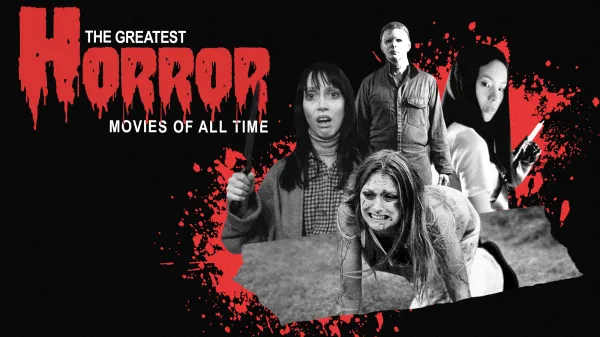Top 10 Horror Movies of All Time: A Deep Dive into the Greatest Scares in Cinema History
Horror movies have long held a special place in the hearts of cinema lovers. From spine-chilling supernatural thrillers to gory slasher flicks, the genre explores the darkest corners of human emotion, instilling fear, anxiety, and awe in audiences. The legacy of horror films stretches across decades, with certain movies leaving an indelible mark on the genre and popular culture. But which are the absolute best? What horror movies have pushed boundaries, shaped the genre, and frightened generations of moviegoers? Below, we explore the top 10 horror films of all time that have stood the test of time and continue to inspire terror in the hearts of viewers.
1. The Exorcist (1973)
Widely regarded as one of the scariest films ever made, The Exorcist remains a benchmark in horror cinema. Directed by William Friedkin and based on William Peter Blatty’s novel, the film tells the story of a young girl, Regan, who becomes possessed by a demonic force. -provoking as it is terrifying.
2. Psycho (1960)
Alfred Hitchcock’s Psycho is a pioneering work in psychological horror that broke new ground in both storytelling and cinematography. It tells the story of Marion Crane, who steals money and checks into the secluded Bates Motel, where she meets the enigmatic and unsettling Norman Bates. The film’s portrayal of a fractured psyche, the creation of the “slasher” genre, and the eerie score are unforgettable aspects that have influenced countless horror movies that followed.
3. The Shining (1980)
Stanley Kubrick’s The Shining, based on Stephen King’s novel, is a psychological horror masterpiece. The film follows Jack Torrance, a writer who takes a job as the winter caretaker of the remote Overlook Hotel, where he begins to unravel mentally, influenced by the hotel’s terrifying supernatural forces .Its exploration of isolation, madness, and the supernatural has made it a benchmark for horror films that dive deep into the human mind.
4. Halloween (1978)
John Carpenter’s Halloween is not only a seminal work in the horror genre but also one of the most influential slasher films ever made. The movie follows Michael Myers, a silent and seemingly unstoppable killer who escapes a psychiatric institution and returns to his hometown of Haddonfield to wreak havoc. Carpenter’s minimalist approach to suspense, combined with an eerie score and effective use of tension, set the standard for slasher films that would follow.
5. Jaws (1975)
Steven Spielberg’s Jaws is a perfect blend of horror, thriller, and adventure. While it may seem like a film about a shark terrorizing a small beach town, it is so much more. The film taps into humanity’s primal fear of the unknown and the uncontrollable, using the shark as a symbol of nature’s terrifying unpredictability. With its unforgettable score by John Williams and the tension it creates, Jaws forever changed the way audiences approached both horror and thrillers.
6. Alien (1979)
Ridley Scott’s Alien is a masterclass in both sci-fi and horror. Set in the distant future, the film follows the crew of the Nostromo spaceship as they encounter a deadly extraterrestrial life form. Alien takes the claustrophobic tension of a haunted house and places it in space, where the characters are isolated and at the mercy of a creature that is far beyond their control. It remains one of the most influential horror films ever made.
7. Rosemary’s Baby (1968)
Roman Polanski’s Rosemary’s Baby is a psychological horror film that expertly builds a sense of dread through atmosphere and character development. The story follows Rosemary, a pregnant woman who begins to suspect that her neighbors have sinister intentions and may be part of a satanic cult. Polanski’s careful direction and Mia Farrow’s stellar performance create an unsettling feeling that stays with the viewer long after the credits roll.
8. The Texas Chain Saw Massacre (1974)
Tobe Hooper’s The Texas Chain Saw Massacre is a visceral, low-budget horror film that became a cultural touchstone. The film follows a group of friends who find themselves stranded in rural Texas and are terrorized by a family of cannibals, including the infamous Leatherface. The film’s raw, gritty style and graphic imagery made it one of the most disturbing films of its time. It was revolutionary in its portrayal of violence, influencing an entire generation of horror filmmakers. Though it’s often cited as one of the most terrifying films of all time, it is also praised for its social commentary on the breakdown of American society.
9. Get Out (2017)
Jordan Peele’s Get Out is a modern horror classic that blends social commentary with psychological terror. The film follows Chris, a Black man who visits his white girlfriend’s family estate, only to uncover disturbing secrets about the family’s true intentions. Get Out takes on themes of race, privilege, and exploitation in a way that is both chilling and thought-provoking. The film’s use of subtle horror, combined with its timely critique of societal issues, made it an instant classic and a breath of fresh air in the horror genre.
10. Hereditary (2018)
A recent addition to the list of horror masterpieces, Hereditary from Ari Aster is a gut-wrenching exploration of grief, trauma, and family secrets. The story follows the Graham family, who are torn apart by the death of their matriarch, leading them to uncover horrifying truths about their ancestry. The film’s unrelenting tension, disturbing imagery, and shocking twists make it one of the most unsettling films in recent years. Toni Collette’s powerhouse performance as a mother struggling with her unraveling family adds an emotional depth to the terrifying story.
Conclusion
The horror genre has a rich history of films that not only entertain but also provoke deep emotions and philosophical reflections. From the groundbreaking classics of the ’60s and ’70s to the thought-provoking masterpieces of the modern era, these 10 films represent the pinnacle of what horror cinema can achieve—provoking fear, introspection, and, ultimately, a deeper understanding of ourselves.



